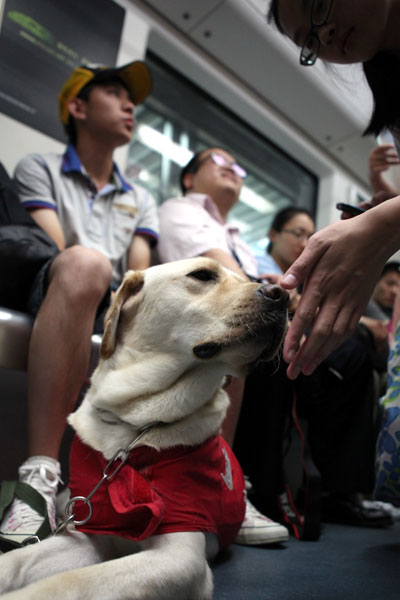Guide dogs will be allowed in public places in China when a new regulation passed by the State Council takes effect on Aug 1.
|
 |
|
A guide dog pictured on a subway train in Shenzhen, Guangdong province, on Tuesday. New regulations will make it easier for guide dogs to travel in public. Provided to China Daily |
The regulation aims to provide more convenient facilities and services for people with disabilities.
Chen Yan has been left blind from congenital cataracts, but the 39-year-old still leads a full life. She owns a piano store and will publish a book titled You Are My Eyes dedicated to her guide dog, Jenny, at the end of this month.
Jenny came into Chen's life in April 2011. Since then the 4-year-old black Labrador has accompanied Chen wherever she goes, from the supermarket to her piano store, or even her travels around China.
"I even ask for Jenny's opinion when I go shopping. 'Yes' sit, 'No' stand," Chen said.
But Chen has also experienced hostile reactions to her guide dog, with Jenny denied access to buses, subways, parks, tourist sites and hotels in cities including Beijing and Nanjing, capital of Jiangsu province.
"Some cities have greater awareness about guide dogs, such as Fuzhou and Xiamen (in Fujian province). I only need to book hotels and flights in advance and explain to them I have Jenny with me," Chen said.
Chen hopes the new regulations will contain detailed rules regarding guide dog access. She said similar requirements allowing guide dogs in public places had been written into earlier government regulations but were poorly enforced.
Jenny is one of only eight guide dogs in Beijing. The total number in China is less than 40. Most of them are from the China Guide Dog Training Center in Dalian, Liaoning province.
Since 2006 the center has given 29 dogs to people with visual impairment. There are 70 dogs currently training to be guides.
Wang Lin, a 26-year-old veterinarian, joined the center in 2009 after she finished studies at Liaoning Medical University. Wang has trained six dogs that are now living in across China.
"Almost all the dogs sent from this center had some difficulties when their owners tried to take them on public transport," Wang said.
Betty, the most recent graduate of Wang's training, found a new home in April and is the first guide dog in Jinan, Shandong province. But it has not all been smooth sailing for Betty — several bus drivers refused to allow her on board. Chen Xin, Betty's owner, insisted on her right to have the same access to public services as people without guide dogs.
Wang, on behalf of the training center in Dalian, went to Jinan with a dog in May to help Chen and Betty. Zhu Weicheng from Zhejiang province also arrived with his guide dog, Feifei.
The three guide dog ambassadors met with officials, introduced the three dogs around Jinan, and spoke with people to raise public awareness.
"If Betty is rejected from buses, other people in Jinan will be afraid to apply for guide dogs later," Wang said.
At the Dalian center it takes a year to train a guide dog and costs up to 150,000 yuan ($23,600). The center relies largely on donations, Wang said.
The center has 12 trainers and is looking for more. But Wang said qualified applicants are in short supply as the charity needs to hire energetic young people who love dogs and are willing to accept modest pay.
The center hopes to receive more financial support from the government as the demand for guide dogs and trainers rises, Wang said.
The only other Chinese city that offers trained guide dogs is Shanghai.
Zhu Wenqi from the Shanghai Guide Dog Association said since 2007, they have trained and placed 16 dogs, and that number will reach 20 by the end of 2012.
Unlike the Dalian center, which hires its own dog trainers, the Shanghai association collaborates with a police dog training institute in Nanjing, capital of Jiangsu province, for breeding and training.
The association accepts applications from visually impaired Shanghai residents. There are currently 20 people waiting for guide dogs.
Zhu said the initial public reaction to guide dogs was quite negative. Some bus drivers avoided the dogs by stopping farther away or just driving past, and some supermarkets refused to let the dogs enter. About half of Shanghai's guide-dog owners are masseuses and some have complained that their workplaces do not allow the dogs.
But as public awareness improves, so is the public response to the dogs, Zhu said.
Yi Wenqin, director of the job center for disabled people in Shenyang, Liaoning, said guide dogs could help visually impaired people rebuild their self-esteem and integrate into society.
Yi hopes the new regulation will be properly implemented and give better protection to this disadvantaged group.
Contact the writer at liyao@chinadaily.com.cn
Wu Yong in Shenyang contributed to this story.
